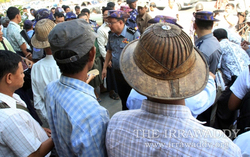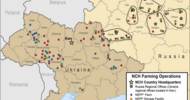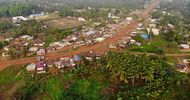The Irrawaddy | 26 October 2012

By SEAMUS MARTOV / THE IRRAWADDY|
A report released today by the international NGO Displacement Solutions calls on Burma’s government to immediately take steps to address the serious lack of housing, land and property (HLP) rights across the county.
The report specifically urges the government to take measures to curb “land grabbing, speculation and displacement with a range of new policies and legislation, including a moratorium on arbitrary forced displacement.”
The current rush of foreign investment into Burma’s agricultural and natural resource sectors, which are expected to grow significantly over the next few years, combined with what the report calls an “almost universal tenure insecurity in both rural and urban areas,” will lead to an increasing number of Burma’s overwhelmingly rural population becoming landless, the report warns.
According to the report, the policy decisions that Burma’s government makes during the coming months regarding the transfer of what is officially state land into privately held assets “will set in place a policy direction that will have a marked impact on the future development of the country and the day-to-day circumstances in which people live.”
Current government policy and the existing rules and regulations overwhelmingly favor wealthy connected business people over the impoverished majority, says the report’s co-author Scott Leckie.
If reform isn’t implemented now, “lower and middle income groups won’t be able to get housing and overall you’ll have a situation of growing insecurity and more and more people facing evictions,” Leckie told The Irrawaddy during a phone interview.
It’s not too late to act, suggests the report, titled “Myanmar at the HLP Crossroads: Proposals for Building an Improved Housing, Land and Property Rights Framework that Protects the People and Supports Sustainable Economic Development.”
The report specifically calls on Burma’s government to hold a wide-ranging public consultation with stakeholders from all levels, including the rural and urban poor, to ensure that the changes underway in Burma do not leave them behind.
“Despite the difficulties associated with addressing HLP issues head on, failing to address these concerns will neither benefit society at large nor those who need protection—the lower income groups in society,” says Leckie.
Less than 18 months into Thein Sein’s nominally civilian government there is ample evidence that the land reform currently underway will actually worsen things for the estimated 80 percent of Burma’s population who live in rural areas. The report notes that recent legislation enacted by Burma’s government, including the Farmland Law, has meant that farmers and the urban poor “are probably even more vulnerable to possible loss of land and displacement and dispossession than they had been under the previous regime.”
Under the legal framework in place today, “the state continues to own all land in the country and whatever rights over land that are accorded are exclusively leasehold rights, user rights, or rights to cultivate a certain land parcel subject to the approval of local government bodies that are appointed by the central government,” the report states.
While Burma’s small-scale tenant farmers do not actually officially own the land they have worked on for generations, the process to get title to the their land as stipulated under the Farmland Law and the Vacant, Fallow and Virgin Lands Management Law enacted on March 30, 2012, puts peasant farmers at a serious disadvantage because they have to deal with a corrupt bureaucracy consisting of the same people who oppressed them for years.
Leckie believes that one way to empower the rural poor is the establishment of a barefoot lawyers program, similar to longstanding rural doctors initiatives, in which lawyers versed in HLP rights travel across rural communities to help farmers deal with the complex land rights challenges they face.
Since Thein Sein became president in April 2011, a series of large-scale development projects have caused serious upheaval in rural areas across the country, including in and around the planned Dawei special economic zone and along the Shwe gas and oil pipeline project that will send fuel from Burma’s Arakan coast to China.
While impoverished rural residents have been forcibly evicted from their land to make way for these billion-dollar projects, well-connected insiders have made quick fortunes in legally questionable speculatory land deals.
In recent months the expansion of the Monywa copper mine by Chinese weapon’s firm Norinco has triggered unprecedented demonstrations from angry farmers who have not been compensated for the loss of their land.
These kinds of protests—once unheard of in Burma—will become very common if Burma’s government and vested economic interests continue to trample the rights of rural people while imposing development from above, says the long-exiled ’88 generation student leader Moe Thee Zun.
The growing number of landless people in the country is the single biggest issue in Burma today, Moe Thee Zun told The Irrawaddy—a conclusion he reached last month during his first visit inside the country in two decades.
The Displacement Solutions report may also prove to be a wake-up call for Aung San Suu Kyi and her National League for Democracy (NLD) party, which has so far been slow to respond to what the Asian Human Rights Commission warns is a coming “land-grabbing epidemic” in Burma.
“We’re hopeful that the NLD will make HLP rights a cornerstone of their policy,” says Leckie.
While Suu Kyi has only vaguely and infrequently addressed the issue of land grabbing during the numerous speeches she has made since her release from house arrest in November 2010, her former colleagues in the breakaway National Democratic Front (NDF) have taken a more public stand on the issue.
The NDF’s chief for Kachin State Bawk Ja has for the past few years led a determined campaign to overturn a series of land confiscations that took place in the state’s fertile Hukawng Valley. The target of her campaign is the Yuzana company, a firm behind one of the largest land grabs in modern Burma, whose owner Htay Myint is widely regarded as a close friend of former dictator Snr-Gen Than Shwe.
Beginning in 2006, Yuzana, with the assistance of then Northern Region Military Commander Maj-Gen Ohn Myint, expropriated more than than 200,000 acres of farmland from hundreds of local Kachin farming families in order to create large-scale plantations of cassava and sugarcane for export to China.
“When Yuzana took our land, we were left with nothing. Before we had plenty of food, but now my family can barely survive,” said a 26-year-old Kachin women whose small-scale family farm in the Hukawng Valley was expropriated in 2006.
Now living in Mai Ja Yang, a town under the control of the Kachin Independence Organization, she said that most of her extensive immediate family remains in the Hukawng valley without land or steady employment. Adding to their woes, she said that can’t visit her family because of the increasingly violent conflict taking place across Kachin State.
The authors of her family’s misfortune, Htay Myint and Ohn Myint, won seats in Burma’s Parliament in 2010, where both individuals are alleged to have used their leverage to ensure that land reform in Burma continues to benefit Yuzana and other well-connected firms.
The struggle for land rights doesn’t just affect ethnic minorities in remote corners of country, but also includes the suburbs of Rangoon. Nay Myo Wai, the chairman of the Peace and Diversity Party, a small party based in Mingaladon Township, has been campaigning on behalf of local farmers locked in a heated dispute with the Zaykabar company, who the farmers allege unfairly acquired their land during the Than Shwe era. Like Yuzana, Zaykabar is headed by a notorious military crony, Khin Shwe, who also serves in Parliament as a member of the ruling Union Solidarity and Development Party.
One way to prevent firms like Zaykabar and Yuzana from uprooting thousands more peasant farmers across Burma is for new laws that explicitly recognize the customary land ownership of the local communities, says Leckie.
“The government needs to acknowledge that customary land rights are a reality in Burma for a large percentage of people both in ethnic and in Burman areas especially in terms of inheritance and succession.”
While Leckie remains optimistic that an equitable and fair land reform policy could still be adopted by Burma’s rulers, he acknowledges that the struggle will be a difficult one as many members of the country’s elite benefit from unjust and unfair policies.
“There is a reluctance to embrace more equitable rights and instead maintain the status quo, which is clearly biased in favor of more powerful and wealthy sectors.”

Farmers rally in Rangoon on Oct. 27, 2012, to protest against the confiscation of their land. (Photo: The Irrawaddy)
By SEAMUS MARTOV / THE IRRAWADDY|
A report released today by the international NGO Displacement Solutions calls on Burma’s government to immediately take steps to address the serious lack of housing, land and property (HLP) rights across the county.
The report specifically urges the government to take measures to curb “land grabbing, speculation and displacement with a range of new policies and legislation, including a moratorium on arbitrary forced displacement.”
The current rush of foreign investment into Burma’s agricultural and natural resource sectors, which are expected to grow significantly over the next few years, combined with what the report calls an “almost universal tenure insecurity in both rural and urban areas,” will lead to an increasing number of Burma’s overwhelmingly rural population becoming landless, the report warns.
According to the report, the policy decisions that Burma’s government makes during the coming months regarding the transfer of what is officially state land into privately held assets “will set in place a policy direction that will have a marked impact on the future development of the country and the day-to-day circumstances in which people live.”
Current government policy and the existing rules and regulations overwhelmingly favor wealthy connected business people over the impoverished majority, says the report’s co-author Scott Leckie.
If reform isn’t implemented now, “lower and middle income groups won’t be able to get housing and overall you’ll have a situation of growing insecurity and more and more people facing evictions,” Leckie told The Irrawaddy during a phone interview.
It’s not too late to act, suggests the report, titled “Myanmar at the HLP Crossroads: Proposals for Building an Improved Housing, Land and Property Rights Framework that Protects the People and Supports Sustainable Economic Development.”
The report specifically calls on Burma’s government to hold a wide-ranging public consultation with stakeholders from all levels, including the rural and urban poor, to ensure that the changes underway in Burma do not leave them behind.
“Despite the difficulties associated with addressing HLP issues head on, failing to address these concerns will neither benefit society at large nor those who need protection—the lower income groups in society,” says Leckie.
Less than 18 months into Thein Sein’s nominally civilian government there is ample evidence that the land reform currently underway will actually worsen things for the estimated 80 percent of Burma’s population who live in rural areas. The report notes that recent legislation enacted by Burma’s government, including the Farmland Law, has meant that farmers and the urban poor “are probably even more vulnerable to possible loss of land and displacement and dispossession than they had been under the previous regime.”
Under the legal framework in place today, “the state continues to own all land in the country and whatever rights over land that are accorded are exclusively leasehold rights, user rights, or rights to cultivate a certain land parcel subject to the approval of local government bodies that are appointed by the central government,” the report states.
While Burma’s small-scale tenant farmers do not actually officially own the land they have worked on for generations, the process to get title to the their land as stipulated under the Farmland Law and the Vacant, Fallow and Virgin Lands Management Law enacted on March 30, 2012, puts peasant farmers at a serious disadvantage because they have to deal with a corrupt bureaucracy consisting of the same people who oppressed them for years.
Leckie believes that one way to empower the rural poor is the establishment of a barefoot lawyers program, similar to longstanding rural doctors initiatives, in which lawyers versed in HLP rights travel across rural communities to help farmers deal with the complex land rights challenges they face.
Since Thein Sein became president in April 2011, a series of large-scale development projects have caused serious upheaval in rural areas across the country, including in and around the planned Dawei special economic zone and along the Shwe gas and oil pipeline project that will send fuel from Burma’s Arakan coast to China.
While impoverished rural residents have been forcibly evicted from their land to make way for these billion-dollar projects, well-connected insiders have made quick fortunes in legally questionable speculatory land deals.
In recent months the expansion of the Monywa copper mine by Chinese weapon’s firm Norinco has triggered unprecedented demonstrations from angry farmers who have not been compensated for the loss of their land.
These kinds of protests—once unheard of in Burma—will become very common if Burma’s government and vested economic interests continue to trample the rights of rural people while imposing development from above, says the long-exiled ’88 generation student leader Moe Thee Zun.
The growing number of landless people in the country is the single biggest issue in Burma today, Moe Thee Zun told The Irrawaddy—a conclusion he reached last month during his first visit inside the country in two decades.
The Displacement Solutions report may also prove to be a wake-up call for Aung San Suu Kyi and her National League for Democracy (NLD) party, which has so far been slow to respond to what the Asian Human Rights Commission warns is a coming “land-grabbing epidemic” in Burma.
“We’re hopeful that the NLD will make HLP rights a cornerstone of their policy,” says Leckie.
While Suu Kyi has only vaguely and infrequently addressed the issue of land grabbing during the numerous speeches she has made since her release from house arrest in November 2010, her former colleagues in the breakaway National Democratic Front (NDF) have taken a more public stand on the issue.
The NDF’s chief for Kachin State Bawk Ja has for the past few years led a determined campaign to overturn a series of land confiscations that took place in the state’s fertile Hukawng Valley. The target of her campaign is the Yuzana company, a firm behind one of the largest land grabs in modern Burma, whose owner Htay Myint is widely regarded as a close friend of former dictator Snr-Gen Than Shwe.
Beginning in 2006, Yuzana, with the assistance of then Northern Region Military Commander Maj-Gen Ohn Myint, expropriated more than than 200,000 acres of farmland from hundreds of local Kachin farming families in order to create large-scale plantations of cassava and sugarcane for export to China.
“When Yuzana took our land, we were left with nothing. Before we had plenty of food, but now my family can barely survive,” said a 26-year-old Kachin women whose small-scale family farm in the Hukawng Valley was expropriated in 2006.
Now living in Mai Ja Yang, a town under the control of the Kachin Independence Organization, she said that most of her extensive immediate family remains in the Hukawng valley without land or steady employment. Adding to their woes, she said that can’t visit her family because of the increasingly violent conflict taking place across Kachin State.
The authors of her family’s misfortune, Htay Myint and Ohn Myint, won seats in Burma’s Parliament in 2010, where both individuals are alleged to have used their leverage to ensure that land reform in Burma continues to benefit Yuzana and other well-connected firms.
The struggle for land rights doesn’t just affect ethnic minorities in remote corners of country, but also includes the suburbs of Rangoon. Nay Myo Wai, the chairman of the Peace and Diversity Party, a small party based in Mingaladon Township, has been campaigning on behalf of local farmers locked in a heated dispute with the Zaykabar company, who the farmers allege unfairly acquired their land during the Than Shwe era. Like Yuzana, Zaykabar is headed by a notorious military crony, Khin Shwe, who also serves in Parliament as a member of the ruling Union Solidarity and Development Party.
One way to prevent firms like Zaykabar and Yuzana from uprooting thousands more peasant farmers across Burma is for new laws that explicitly recognize the customary land ownership of the local communities, says Leckie.
“The government needs to acknowledge that customary land rights are a reality in Burma for a large percentage of people both in ethnic and in Burman areas especially in terms of inheritance and succession.”
While Leckie remains optimistic that an equitable and fair land reform policy could still be adopted by Burma’s rulers, he acknowledges that the struggle will be a difficult one as many members of the country’s elite benefit from unjust and unfair policies.
“There is a reluctance to embrace more equitable rights and instead maintain the status quo, which is clearly biased in favor of more powerful and wealthy sectors.”













